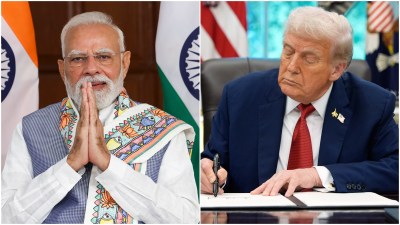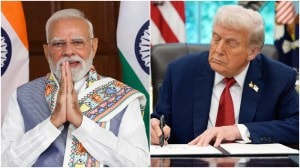Department of Divestment for 34 pc stake sell off in IBP
NEW DELHI, AUG 8: Disinvestment Minister Arun Shourie is likely to meet Petroleum Minister Ram Naik within a week with a proposal for priv...

NEW DELHI, AUG 8: Disinvestment Minister Arun Shourie is likely to meet Petroleum Minister Ram Naik within a week with a proposal for privatisation of IBP by selling 34 per cent government equity through competitive bids.
The two ministers are likely to thrash out their differences on privatisation of IBP even though Disinvestment Ministry has disfavoured the Petroleum Ministry’s proposal for direct sale of government equity to another state owned oil PSU – Indian Oil Corporation, official sources indicated.
The sources clarified that Department of Disinvestment (DoD) was not against IOC taking over the marketing company IBP provided it participated through bids and its offer was the best.
DoD is believed to have drafted a proposal for privatisation of IBP, where government presently holds 59.59 per cent stake, on the lines suggested by the Disinvestment Commission in its fifth report, submitted to government in November 1997.
The DoD move assumes significance in the backdrop of the decision of Cabinet Committee on Disinvestment, headed by Prime Minister Atal Bihari Vajpayee, that any proposal for disinvestment by DoD should come after consultation with the concerned administrative ministry even though CCD turned down the demand for strategic status to Petroleum sector.
In its earlier meeting CCD had identified IBP for disinvestment during the current financial year, but had not specified the quantum and manner of offloading of government equity in the company which has a staggering network of over 1500 retail outlets.
Oil Industry sources said that Petroleum Ministry has supported the IOC’s claim for IBP in view of the CCD’s decision to give strategic status to only three oil companies, IOC, GAIL and ONGC as an effective countervailing tool in the face of imminent privatisation.
IOC board had written to Petroleum Ministry last month expressing desire to buy out government stake in IBP, but two other oil PSUs Hindustan Petroleum and Bharat Petroleum also followed suit and approached government with their proposals.
Petroleum Ministry is believed to be giving weightage to IOC on the grounds that BPCL and HPCL could also be privatised in the short to medium term and this would in effect give the advantage to any domestic or global player which decided to pick equity in either of the two oil PSUs.
IOC chief Pathan had earlier said that corporation would consider picking up stake in HPCL and BPCL as and when the government decided to part with its equity.
The Commission had recommended that "the 33.9 per cent stake may be offered to an Indian oil company, or joint sector oil company or foreign oil companies through an international global bidding process."
Meanwhile, IOC sources said that corporation would give a firm offer after the government came with a clear proposal, listing out if it wanted to sell IBP stake in various joint ventures and subsidiaries separately or the equity sale would be for the composite company.
The IOC-led consortium, was awarded a Letter of Support (LoS) by Andhra Pradesh government to set up the Rs 19,400 crore hydrocarbon terminal at Kakinada Port, would float five separate joint ventures to execute various components of the project.
The state government had on August 3 last given LoS to the consortium to take up the project which would become operational within the next four years, IOC chairman M A Pathan said in Hyderabad. A Detailed Project Report (DPR) would be ready in the next six months and Financial closure would be achieved within an year, he said.
Under the first phase of the project, the first being taken up on the country’s east coast, a Liquified Natural Gas (LNG) berth, storage and regassification facilities and pipeline network would be put in place at a cost of Rs. 5,150 crore, the IOC Chief said.
The second phase of the project would entail an investment of Rs 6,300 crore while in the subsequent phase a mega power project costing Rs 4,000 crore and inland storage and distribution of Dimethyl Ether (DME) involving an investment of Rs. 300 crore would be taken up, Pathan said.
The IOC, Malaysian oil major Petronas and Cocanada Port Company Ltd (CPCL), a Special Purpose Vehicle constituted by Singapore-based International Seaport PTE Limited (ISPL), are the partners in Kakinada Indian Oil LNG Consortium (KIOLC).
The LNG terminal would be developed as a `gateway to the South’ to cater to the gas-based power projects and other industries in the region, Pathan said.
The consortium would form five separate joint venture companies to deal with various components of the project like shipping, regassification, terminal links, pipeline networks, marketing and distribution and the mega power project with a minimum of 1,000 MW to be located within AP `preferably in and around Kakinada town,’ he said.
About equity participation among consortium members, he said IOC would pick up a minimum of 26 per cent equity share which might go up to a maximum of 50 per cent depending on its role in each of the components.
While the project has been targeted for completion within 42 months of finalisation of detailed project report and statutory approvals, a new floating storage technology option could help advance the commissioning by an year, the IOC chairman said.
The technology, still in nascent stage, would, however,push up the project cost as it involves stationing of dedicated tankers at the site.




- 01
- 02
- 03
- 04
- 05


























